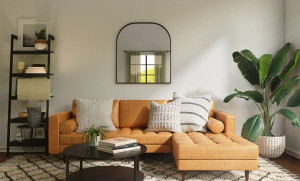Can low-income earners build a home?
Posted on 30/06/2022 10:46 AM | by NaijaHouses

“With the recession lingering and hitting hard on real estate sector, many prospective homeowners are dumping the idea of homeownership, while others want to build a simple home that is comfortable and affordable, without going into debt.
It is a fact that in most Nigerian cities, the dreams of lower construction costs have once again become a nightmare for a lot of aspiring homeowners, going by fresh increases in the prices of basic building materials. For instance, retail prices of cement has remained high, about N2, 700 per bag while manufacturers of cement-based materials, such as ceiling boards, roofing sheets and concrete products have hiked their prices.
Consequently, the development has further slowed down housing construction, real estate activities and increased the prices of other building materials’ component. Developers in the Nigerian housing market focus almost exclusively on the luxury residential market. However, this market segment is already experiencing an oversupply.
Then, how affordable can owning a home be for most Nigerians? A recent survey published by KPMG, stated that 77 per cent of Nigerians earn less than N40, 000 monthly – a segment described as the ‘bottom mass market’. Affordability for this level would be determined as a house costing no more than 30 per cent of N40, 000 (N12, 000).
Over a 10-year period (most housing loans available in Nigeria are of a much shorter tenure), and at a remarkable interest rate of 6 per cent (as obtained from the Federal Mortgage Bank of Nigeria), such a house would be valued at about N1.1millon. This is a shocking revelation for most people, yet this is the reality in which we live in Nigeria. ‘Who can build a home for such an amount?
For Mr. Sam Odia, the Chief Executive Officer, Millard Fuller Foundation (MFF), “Affordability is determined by a number of factors, key of which are the income level of the buyer, the cost of land, materials and labour that go into building the house and the cost of funds.”
MFF has been involved in producing simple, decent and very affordable homes from N1.65million for ordinary Nigerians. The 400-unit Grand Luvu Affordable estate is located in Masaka, near Abuja. On this project, subscribers pay about N12, 000 per month.
He said: “From our own experience, the material component of a building actually accounts for less than 35 per cent of the final cost of the home. Our house designs are also very frugal and economical in the use of space.”
The Managing Director, Bolyn Construction Company Limited, Mr. Rufus Akinrolabu said the solution lies in the sourcing and use of local materials in Nigeria’s construction industry.
For more than two decades, the company has fabricated machines from metals and steels, which mould bricks, roofing sheets, and other building materials, using laterite soil and other raw materials.
As evidence of his belief in the crusade, Akinrolabu built his private home in Ikorodu, Lagos and completed a second country home at his Ondo residence as well as an office building for his Lagos based company. He said builders using the technology could make up to 50 per cent savings.
He told The Guardian, “you can make bricks that do not require cement because laterite soil that we are preaching is a soil that contains an addictive from God; clay is free.”
Source:Nigeriarealestatehub